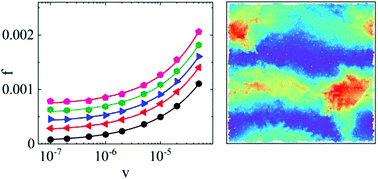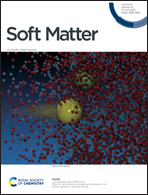Rheological similarities between dense self-propelled and sheared particulate systems
Abstract
Different from previous modeling of self-propelled particles, we develop a method to propel particles with a constant average velocity instead of a constant force. This constant propulsion velocity (CPV) approach is validated by its agreement with the conventional constant propulsion force (CPF) approach in the flowing regime. However, the CPV approach shows its advantage of accessing quasistatic flows of yield stress fluids with a vanishing propulsion velocity, while the CPF approach is usually unable to because of finite system size. Taking this advantage, we realize cyclic self-propulsion and study the evolution of the propulsion force with the propelled particle displacement, both in the quasistatic flow regime. By mapping the shear stress and shear rate to the propulsion force and propulsion velocity, we find similar rheological behaviors of self-propelled systems to sheared systems, including the yield force gap between the CPF and CPV approaches, propulsion force overshoot, reversible–irreversible transition under cyclic propulsion, and propulsion bands in plastic flows. These similarities suggest underlying connections between self-propulsion and shear, although they act on systems in different ways.



 Please wait while we load your content...
Please wait while we load your content...